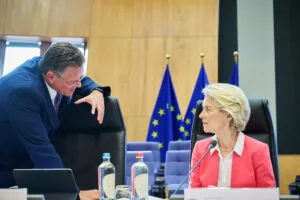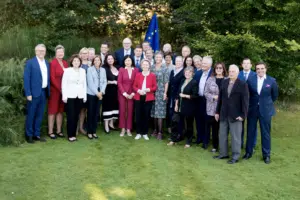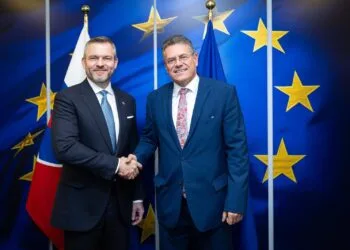From the correspondent in Strasbourg – Having boarded the heads of state and government (who named her) and passed the hurdle of the MEPs (who confirmed her), Ursula von der Leyen, re-elected President of the European Commission, begins the journey that will lead her by the end of the year to take office for another five years at the Berlaymont with a new team of 26 commissioners, in addition to herself. With the acceleration by the EU institutions for von der Leyen’s confirmation after the June 6–9 European elections (it took only 38 days between the result of the polls and the vote in the EU Parliament plenary), the timetable can be tightened to form and approve a College of Commissioners by the fall, with the inauguration scheduled for November 1.

As for the timing of this process, President von der Leyen explained what will happen soon, another tour de force after that already accomplished in exactly the three weeks that separated her appointment in the European Council (on June 27) from her confirmation in the Strasbourg hemicycle yesterday (July 18). “In the coming weeks, I will ask the member states to propose the commissioner candidates, one man and one woman,” was the anticipation at a press conference after the MEPs’ vote. This preparatory phase will last about three weeks, after which “I will listen to them in mid-August,” added the German president of the EU Commission, who has already made clear some standards for the new College: “I want to choose the best who share the European commitment, and in terms of numbers there will be parity between men and women.”

About the proposals of the member states, already in the weeks following the June European elections, the first applications have started coming in, which, however, do not comply at the moment with the request of the re-elected president von der Leyen—the same she made in 2019—for a man and a woman. In addition to Germany, which will express the presidency of the Commission with Ursula von der Leyen and Estonia, which will see the outgoing premier, Kaja Kallas, become EU High Representative for Foreign Affairs and Security Policy, Slovakia has nominated the outgoing vice president Maroš Šefčovič, Latvia the outgoing Vice President Valdis Dombrovskis, Slovenia the lawyer and economist Tomaž Vesel, Ireland the former Minister of Finance, Michael McGrath, Sweden the Minister for European Affairs, Jessika Roswall, and Finland the popular MEP Henna Virkkunen. Italy has not yet disclosed the official candidate but, speaking exclusively to Eunews, Forza Italia’s head of delegation to the EU Parliament, Fulvio Martusciello, said that “the commissioner should be Minister Raffaele Fitto; we have already debated it extensively, and that will be.” Fitto is currently Minister for European Affairs, Cohesion Policies, and NRRP, an expression of the Fratelli d’Italia party.
Towards the von der Leyen-bis Commission
According to the EU Treaties, European commissioners—one from each member country—are appointed by agreement between the EU Commission presidency and the member states, which suggest them based on general competence, European commitment, and guarantees of independence. The Council of the European Union adopts the list of commissioners, and each must also pass the European Parliament vote. It is clear that not only the political composition of the government that nominates its candidate should be considered, but also that of the majority that holds the Commission in the European Parliament. In other words, a right-wing government will not be able to overlook the fact that it will have to cash in on the approval of the centre-left as well: this is the case, for example, of Giorgia Meloni’s Italian government, which will have to look for an acceptable name even for the Democratic Party, which in the new legislature constitutes the largest delegation within the group of the Progressive Alliance of Socialists and Democrats (S&D).

Putting together the new team of European commissioners means striking a delicate balance with the 26 national governments (minus Germany’s) to agree on roles and portfolios to be assigned. If von der Leyen can reach a compromise quickly for the Council’s adoption of the list of names to be proposed to Parliament, it could lead to hearings as early as September and October. Each parliamentary committee will review the candidates with written questions and in public hearings, each based on its area of expertise. Finally, the Conference of Presidents will have to prepare a draft resolution to be voted on by all 720 MEPs (watch for the October 7-10 and 21-24 plenary sessions) when a simple majority of the votes will have to approve the appointment of the entire College of Commissioners. The natural start of the von der Leyen Commission’s five-year term is November 1.
English version by the Translation Service of Withub









